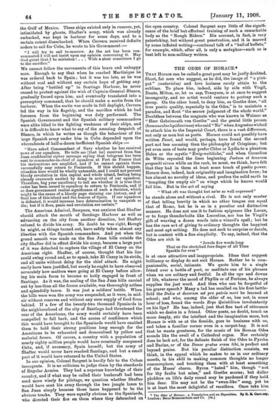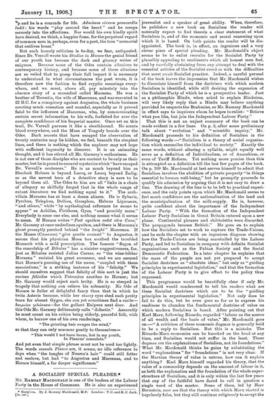THE ODES OF HORACE.*
THAT Horace can be called a great poet may be justly doubted. Short, fat men who suggest, as he did, the image of "a pint- pot " (sextariolus) and love laziness rarely attain to the
sublime. To place him, indeed, side by side with Virgil, Dante, Milton, or, let us say, Tennyson, is at once to suggest incongruity, and no artist would venture to portray such a group. On the other band, to deny him, as Goethe does, "all true poetic quality, especially in the Odes," is to maintain a paradox, and flout "the secure judgment of the whole world." Doubtless between the magnate who was known in Weimar as "Herr Geheimrath von Goethe" and the genial little person (homunculuslepidissimms) who said "No" when Augustus wished to attach him to the Imperial Court, there is a vast difference, not only as men but as poets. Horace could not possibly have written Faust, and would, perhaps, have found the second part not less amusing than the philosophy of Crispinus; but yet even men of taste may prefer Chloe or Lydia to a phantom Helen or the mystic "Ewig-weibliche," and when Cornelius de Witte repeated the lines beginning Justunt el tenacens propositi virum while on the rack, he must, we think, have felt that they had in them at least some touch of poetic power. Horace does, indeed, lack originality and imaginative force; be has almost no novelty of ideas, and prefers the solid earth to "tempting the empty air" on wings which he knows would fail him. But in the art of saying
"What oft was thought but ne'er so well expressed"
be stands alone and without a rival. He is not only master of that telling brevity in which no other tongue can equal that of Rome, but he is so in a peculiar and distinctive manner. He does not use it to fashion epigrams like Lucan, or to forge thunderbolts like Lucretius, nor has he Virgil's gift of weaving a dozen words into a wizard's spell ; but be has the rare art of giving to ordinary thoughts the happiest
and most apt setting. He does not seek to surprise or dazzle, but is content with a fine simplicity. To say, indeed, that the Odes are rich in
"Jewels five words long That on the stretched fore-finger of all Time Sparkle for ever"
is at once attractive and inappropriate. Ideas that suggest brilliancy or display do not suit Horace. Rather be is com- panionable, social, intimate. We quote him to a single friend over a bottle of port, or meditate one of his phrases when we are solitary and fretful. In all the ups and downs of life, whatever the mood of Phyllis or of Fortune, he always supplies the just word. And then who can be forgetful of his graver speech P Many a lad has recalled on his first battle- field the Dulce et decorum est pro patria mori he learned at school; and who, among the older of us, has not, in some hour of loss, found the words Ergo Quintilium involuntarily on his lips? He has, indeed, just that fine tact of utterance which we desire in a friend. Other poets, no doubt, touch us more deeply, stir the intellect and the imagination more, but Horace is with us at the fireside, goes to business with us, and takes a familiar corner even in a carpet-bag. It is not that he wants greatness, for the music of his Roman Odes sounds like the swell of a Cathedral organ. Nor certainly does he lack art, for the delicate finish of the Odes to Pyrrha and Barine, or of the Donee grains cram tibi, is perfect and beyond praise. But his peculiar distinction consists, we think, in the appeal which he makes to us in our ordinary moods, in his skill in making common thoughts no longer commonplace, and touching them with at least something of the Muses' charm. Byron "hated" him, though "not for thy faults but mine," and Goethe scorns; but duller plodders on life's daily round may be pardoned if they hold .
him dear. His may not be the "swan-like" song, yet he is at least the most delightful of versifiers. Once take him
• The Odes of Horace : a Translation and an Reposition. ByE, R. Garn pep, London Swan Sonnennchein and Co. [63.1
Up and he is a comrade for life. Admissus dram praecordia ludit his words "play around the heart" • and be creeps securely into the affections. Nor would his own kindly spirit have desired, we think, a happier fame, for the perpetual regard of common- men is, perhaps, even for a poet, the true "memorial that outlives brass."
But such homely criticism is to-day, we fear, antiquated. Since Dr. Vernal wrote his Studies in Horace the genial friend of our youth has become the dark and gloomy writer of enigmas. Because some of the Odes contain allusions to contemporary history, and because some of these allusions are so veiled that to grasp their full import it is necessary to understand in what circumstances the poet wrote, it is therefore now the fashion to find cryptic meanings every- where, and we must, above all, pry minutely into the obscure story of a scoundrel called Muraena. He was a brother of Terentia, the wife of Maecenas, and was executed in 22 B.C: for a conspiracy against Augustus, the whole business creating much sensation and scandal, especially as it proved fatal to the influence of Maecenas, who, by communicating certain secret information to his wife, forfeited for ever the complete confidence of his Imperial master. Once set on this trail, Dr. Verrall pursues it like a sleuthhound. He scents blood everywhere, and the Muse of Tragedy broods over the Odes. Dark secrets that have escaped the observation of twenty centuries may lie hidden, we feel, beneath the simplest lines, and there is nothing which the explorer may not hope with sufficient ingenuity to discover. It is an animating thought, and it has stirred all Mr. Garnsey's enthusiasm. He is net one of those disciples who are content to be only as their master, but he is proud to unravel mysteries which "have escaped Dr. Verrall's acuteness." He is as much beyond him as Sherlock Holmes is beyond Lecoq, or Lecoq beyond Zadig, or as the newest hero of a detective story is sure to be beyond them all. The Odes to him are all "links in a chain of allegory so skilfully forged that in the whole range of extant literature we find nothing equal to it." The arch- villain Muraena has at least a dozen aliases. He is Sybaris, Pyrrhus, Telepbus, Dellius, Grosphus, Hebrus Liparaeus, "and others," while "by mythological reference he seems to appear" as Achilles, Pirithous, G-yas, "and possibly more." Everybody is some one else, and nothing means what it seems to mean. If Horace writes "Post equitem sedet abet Cura," Mr. Garnsey at once underlines equitem, and there is Muraena's ghost promptly perched behind "the knight" Maecenas. If the Muses (Camenae) "give gentle counsel" to Augustus, it means that his physician Musa has soothed the troubled Monarch with a mild prescription. The famous "flagon of the consulship of Bibulus" has a sinister suggestiveness, for, just as Bibulus resisted Julius Caesar, so "the wine-bibber Muraena" resisted his great successor, and we are assured that Horace's punning use of the name, "coupled with these associations," is a striking instance of his "felicity." We should ourselves suggest that felicity of this sort is just the curiosa felicitas which Petronius ascribes to Horace ; but Mr. Garnsey would reject such levity. He is so steeped in tragedy that nothing can relieve his solemnity. No Ode of Horace is fuller of delightful fancy than that in which he twits Asterie because, while her starry eyes shed such pretty tears for absent Gyges, she can yet sometimes find a smile- aaspecke yacioaara—for the gallant Enipeus next door. And this Ode Mr. Garnsey deliberately calls "didactic." Assuredly he must count on his critics being elderly, peaceful folk, with whom, to borrow one of his own renderings, "The grizzling hair swages the mind," so that they can only murmur gently to themselves— "This would I not have borne, hot in my youth, In Plancus' consulate."
And yet even that simple phrase must not be used too lightly. The words ccmsule Planco are, it seems, no idle reference to days when "the tangles of Neaera's hair" could still' fetter and enslave, but had "to Augustus and Maecenas, and to Horace himself, a far deeper significance."











































 Previous page
Previous page